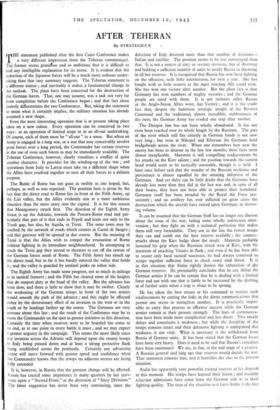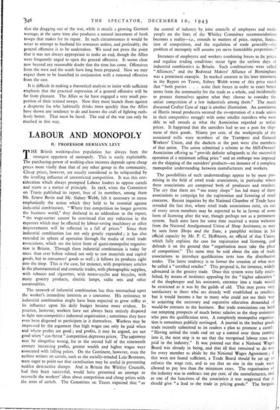AFTER TEHERAN
By STRATEGICUS • Even the most interesting operation that is at present taking place takes on a new colour. Every operation can be conceived in two ways : as an operation of limited scope or as an all-out undertaking. Of course, each of them must be " all-out " in a sense. But when an Army is engaged in a long war, or a war that may conceivably involve great forces over a long period, the Commander has certain reserves in the use of even such forces as may be immediately available. The Teheran Conference, however, clearly visualises a conflict of quite another character. It provides for the winding-up of the war ; and operations from Italy to Latvia must take on a different shape when the Allies have resolved together to turn all their forces to a definite purpose.
The Battle of Rome has not gone as swiftly as one hoped, but, perhaps, as well as was expected. The position here is given by the fact that the direct road to Rome lies in front of the Fifth Army, up the Liri valley, but the Allies evidently aim at a more ambitious objective than the mere entry into the capital. It is for this reason that Montgomery struck first. The direction of the Eighth Army thrust is up the Adriatic, towards the Pescara-Rome road and par- ticularly that part of it that ends in Popoli and leads not only to the Tivoli gap, but also, by Aquila, to Terni. The same town may be reached by the network of roads which centres in Castel di Sangro ; and this gateway will be opened in due course. But the meaning of Terni is that the Allies wish to compel the evacuation of Rome without fighting in its immediate neighbourhood. In attempting to reach the Terni gap they intend to threaten to cut off the retreat of the German forces south of Rome. The Fifth Army has struck up the direct road, but so far it has hardly entered the valley that holds it ; and the valley is guarded by sentinel peaks on either side.
The Eighth Army has made some progress, not so much in mileage as in tactical features ; and the Fifth has cleared some of the heights that do outpost duty at the head of the valley. But the advance has been slow, and there is little to show that it may be swifter. Clearly the weakening of the German troops in front of the two armies would smooth the path of the advance ; and this might be effected either by the diversionary effect of an invasion in the west or in the south or by landings farther up the coasts. The Germans are very nervous about this last ; and the result of the Conference may be to move the Commander on the spot to greater initiative in this direction. Certainly the time when reserves were to be hoarded has come to an end, as at one point in every battle it must ; and we may expect a greater urgency in the campaign. This seems the more likely since any invasion across the Adriatic will depend upon the enemy troops in Italy being pinned down and at least a strong protective flank being established across the peninsula. Certainly any advancing sector will move forward with greater speed and confidence when the Commander knows that the- troops on adjacent sectors are being fully extended.
It is, however, in Russia that the greatest change will be affected. Russia has caused some impatience in many quarters by her insis- tence upon a "Second Front," or the diversion of "Sixty Divisions." The latter suggestion has never been very convincing, since the
defection of Italy diverted more than that number of divisions— Italian and satellite. The position seems to be less stereotyped than that. It is not a matter of sixty or seventy divisions, but of diverting and holding a sufficient number of units to justify Russia in throwing in all her reserves. It is recognised that Russia has now been fighting on the offensive, with little intermission, for over a year. She has fought with as little reserve as the mpst exacting Ally could wish. She has won one victory after another. But the plain fact is that Germany has won numbers of mighty victories ; and the German people are sated with them. It is not victories either Russia or the Anglo-Saxon Allies want, but Victory ; and it is the crude fact that, despite the luminous strategic insight of the Russiaa Command and the traditional, almost incredible, stubbornness of the men, the German Army has evaded one trap after another.
The Dnieper line has not been wholly abandoned. It has not even been reached over its whole length by the Russians. The part of the river which still lies entirely in German hands is not now very long ; but even at Nikopol and Kherson the Germans hold bridgeheads across the river. When one remembers how near the enemy has been to disaster in the last few months, these facts seem almost inexplicable. Manstein is still compelling readjustments by his attacks on the Kiev salient ; and the position towards the eastern bend would seem to be tactically untenable, though it is held. I have once before said that the wonder of the Russian resilience and persistence is almost equalled by the amazing defensive of the Germans. And yet there can be little doubt that the Germans have already lost more than they did in the last war and, in spite of all their boasts, they have not been able to protect their homeland. Germany itself has been invaded by the Royal Air Force per- sistently; and no artillery has ever inflicted on great cities the destruction which the aircraft have rained upon Germany in increas- ing volume.
It can be assumed that the German Staff has no longer any illusion about the issue of the war, failing some wholly unforeseen inter- vention; but they fight on with a technical perfection that makes them still very formidable. They use in the line the fewest troops they can and comb out the best reserve available ; the counter- attacks about the Kiev bulge show the result. Manstein probably loosened his grip when the Russians struck west of Kiev, with the intention of attacking Vanitin in flank ; and even if he has been able to secure only local tactical successes, he had always contrived to scrape together sufficient force to check every vital threat. It is in this situation that Stalin rightly desires the exhaustion of ...the German reserves. He presumably concludes that he can defeat the German armies if he can be certain that he is dealing with a limited force and not with one that is liable to be increased by the drafting in of further units when a trap is about to be sprung.
He has taken the best means at his command to restrict such reinforcement by cutting the links in the direct communications that permit one sector to strengthen another. It is practically impos- sible to carry that process to effective success while the German armies remain at their present strength. The lines of communica- tion have been made more complicated and less direct. This entails delays and constitutes a weakness ; but while the discipline of the troops remains intact and their defensive fighting is unimpaired this weakness is not vital. What is necessary is the withdrawal from Russia of German units. It has been stated that the German losses have been very heavy. Does it need to be said that Russia's casualties have been enormous? We are, in fine, at the end stage of a process. A Russian general said long ago that reserves would decide the war. That statement remains true, and it furnishes the clue to the present situation.
Stalin has apparently very powerful trained reserves at his disposal at this moment. His troops have learned their lesson ; and recently reluctant admissions have come from the German side as to their fighting quality. The crux of the situation as it *faces Stalin is the fact
that the dragging out of the war, while it entails a growing German wastage, at the same time also produces a natural increment of fresh troops that makes for its repair. In such circumstances it would be wiser to attempt to husband his resources unless, and .preferably, the general offensive is to be undertaken. We need not press the point that it was not always appropriate to make an end, though the Allies were frequently urged to open the general offensive. It seems clear now beyond any reasonable doubt that the time has come. Offensives from the west and the south have long been prepared. Now we may expect them to be launched in conjunction with a renewed offensive from the east.
It is difficult in making a theoretical analysis to insist with sufficient emphasis that the practical expression of a general offensive will be far from pleasant. The Allies so far have engaged a very small pro- portion of their trained troops. Now they must launch them against a desperate foe who habitually thinks more quickly than the Allies have shown any tendency to do and knows the craft of fighting ruth- lessly better. That must be faced. The end of the war can only be reached in this way.



























 Previous page
Previous page